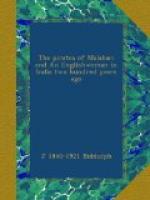There remained the duty of sending him ‘an Englishman of credit’ to ‘deliver him the articles.’ The Council, ’knowing him to be a man of ill principles,’ thought it improper to order any man on such a risky service, but Lieutenant Mackintosh, in consideration of a gratuity of one thousand rupees, undertook to go, and departed for Colaba, with Rs.30,000 as ransom for the European prisoners, the convention sealed with the Council’s seal, and ships to bring back the restored goods.
And so for a time there was security from Angria’s attacks, but, with his hands free on the Satara side, and in a more secure position than ever, it was not likely that the peace would be of long continuance. With a fleet of armed vessels carrying thirty and forty guns apiece, with Kennery island in his possession within sight of Bombay harbour, Angria and his successors continued to be a menace to the existence of Bombay, while the Angrian territory became the Alsatia of the Indian seas, where desperadoes of all nationalities were made welcome.
The next few years saw an enormous increase of piracy in the Indian seas. Angria was practically secure in his fastnesses along the coast, and plundered every ship not strong enough to defend itself. His finest vessels were commanded by Europeans, generally Dutch. The signing of the Peace of Utrecht brought a fresh swarm of European adventurers to reap the harvest of the seas. The privateersmen, disregarding the peace, under pretence of making war on France and Spain, plundered ships of all nations. Conden,[7] White, England, Taylor, and many others, made Madagascar their headquarters, and emulated the feats of Every and Kidd. The Beyt pirates were as mischievous as ever, while the Muscat Arabs could muster, in 1715, a ship of seventy-four guns, two of sixty, one of fifty, eighteen carrying thirty-two to twelve guns each, and a host of smaller vessels carrying never less than four guns. The Company was forced to rely on its own exertions, as there was not a single King’s ship in Indian waters. The few armed vessels belonging to Bombay convoyed the more valuable vessels along the coast. The larger ships, that made the ocean voyage between India and Europe, sailed in company for mutual protection.




